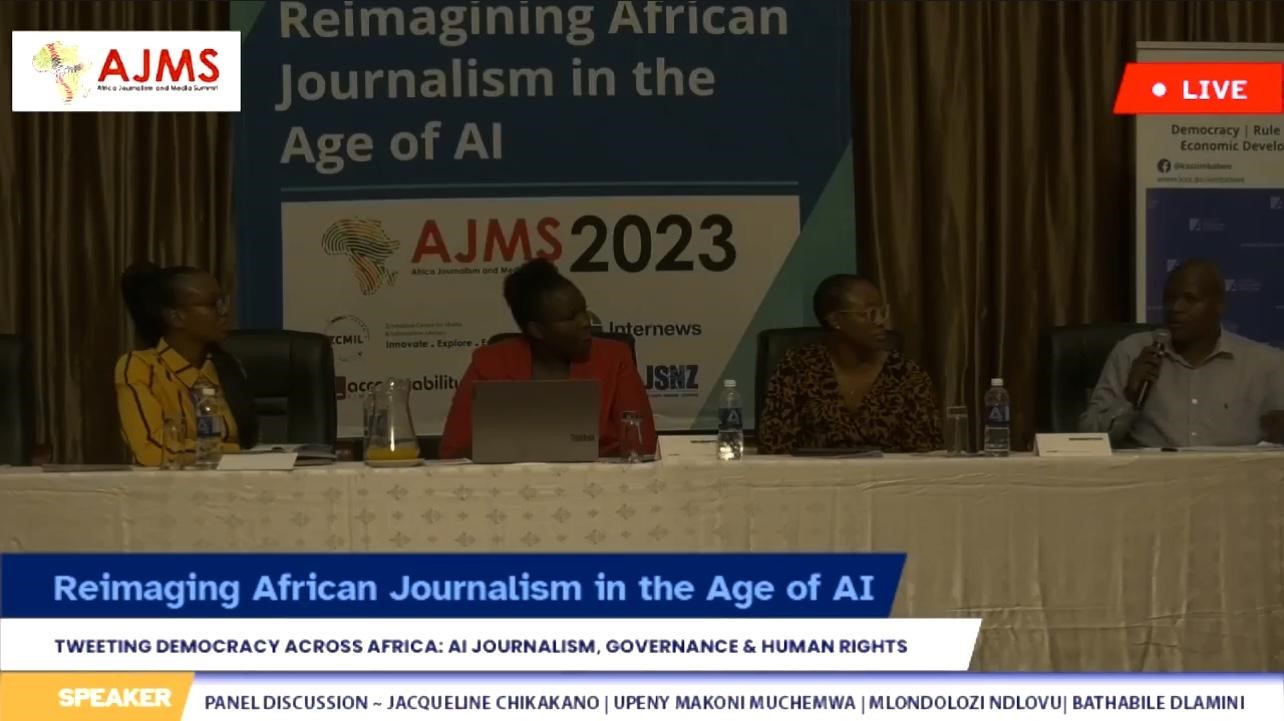NEWS

IN BRIEF
Mlondolozi Ndlovu, a Journalism Lecturer at Christian College of Southern […]
SHARE
Mlondolozi Ndlovu, a Journalism Lecturer at Christian College of Southern Africa Zimbabwe (CCOSA), believes that progress will be achieved when marginalized communities attain digital inclusion and AI technologies are relevant and accessible to their unique circumstances.
Ndlovu has explored the extent of internet accessibility within his community in Zhombe, Midlands, finding that only five out of 76 homesteads possessed internet-enabled devices.
None of the five homesteads owned a Twitter or X.com account, while Only four were acquainted with WhatsApp. The homestead possessing the remaining handset used it exclusively to play music.
Two other panelists shared the same reality, presenting arguments about bridging digital disparities, harnessing opportunities, and ensuring effective inclusion and participation of all communities to promote democracy.
Upenyu Makoni-Muchemwa, Accountability Lab Zimbabwe’s Media and Communications Manager, and Jacqueline Chikakano, Media Lawyer at Internews Zimbabwe, also spoke during the panel discussion at the Africa Journalism Media Summit AJMS 2023 on “Tweeting democracy Across Africa: AI-powered journalism, governance and human rights.” The session discussed the new and critical dimensions of AI-powered journalism, governance, and human rights in today’s digital age present for inclusive democratic participation.
According to Muchemwa, the real challenge of AI lies within the frame of inclusion, as the digital divide is widening and deepening. She argued that those with access to internet-enabled devices and digital technologies have not yet realized their full benefit in improving their lives. She further urged that Africa’s most pressing challenge is inequality, which has serious consequences for inclusion.
“This brings up questions of if Africa benefits more or less than industrialized countries from the rise of the Internet and new media,” said Makoni-Muchemwa.
Africa is one of the most marginalized and excluded regions in the world, according to the UN Human Development Report, with Sub-Saharan Africa being the least developed region.
The affordability of AI presents another challenge, considering that its use requires access to the Internet. Zimbabwe ranks 58 out of 72 low-income countries in terms of Internet access affordability, according to the Alliance for Affordable Internet ranks in 2021.
Addressing barriers to mobile internet adoption, such as affordability and digital skills, should be a priority for stakeholders to realize the potential of mobile connectivity in driving economic growth and development in a post-pandemic world.
Other challenges highlighted during panel discussions include digital safety, protecting access, and the participation of women in digital spaces. Adding light to this disparity was Patience Zirima’s argument that women are subject to gendered disinformation and misinformation, which is misogynistic.
However, to bridge this gap, the constitutional framework was an essential aspect of this discussion, as Chikakano explained in her presentation. The provisions in the Zimbabwean Constitution foster the participation of all.
Chikakano highlighted that legislative measures such as the Cyber and Data Protection Acts play a vital role in creating a framework for digital spaces. However, legislatures must contextualize these frameworks to make them relevant to all communities using AI. Zimbabwe’s constitutional framework and legislation form a solid foundation, but challenges remain in ensuring the effective inclusion and participation of all communities in the digital sphere.
Approaches to overcoming digital exclusion should be robust, considering the context and realities of the communities adopting these technologies. Equipping communities with the necessary skills to adapt and utilize AI technology effectively is vital. Education and training initiatives can help bridge this gap and empower individuals within communities. AI can be a powerful tool to advance democracy if the technology is embraced and utilized to its full potential.
“If we are to appreciate technology, and if we are to use technology to our advantage concerning our daily work, be it farming or mining, then adoption and use of AI for democracy will be guaranteed,” says Ndlovu.
Governments must develop policies outlining how communities can adopt and benefit from AI. Policies should also address other challenges, including the lack of necessary skills to effectively use technology and limited access to the Internet, which is a significant barrier to inclusivity.
Community inclusion in AI adoption is critical to foster participation and democracy in Zimbabwe. Understanding the constitutional framework and addressing community needs will pave the way for meaningful AI integration.
Overcoming challenges related to skills, internet access, and policy direction is vital. By leveraging the potential benefits of AI adoption, such as combating misinformation and empowering community media organizations, Zimbabwe can ensure that AI technology improves the lives of its citizens and promotes democracy.
—
Bathabile Dlamini is the Media and Communications Officer at Accountability Lab Zimbabwe
